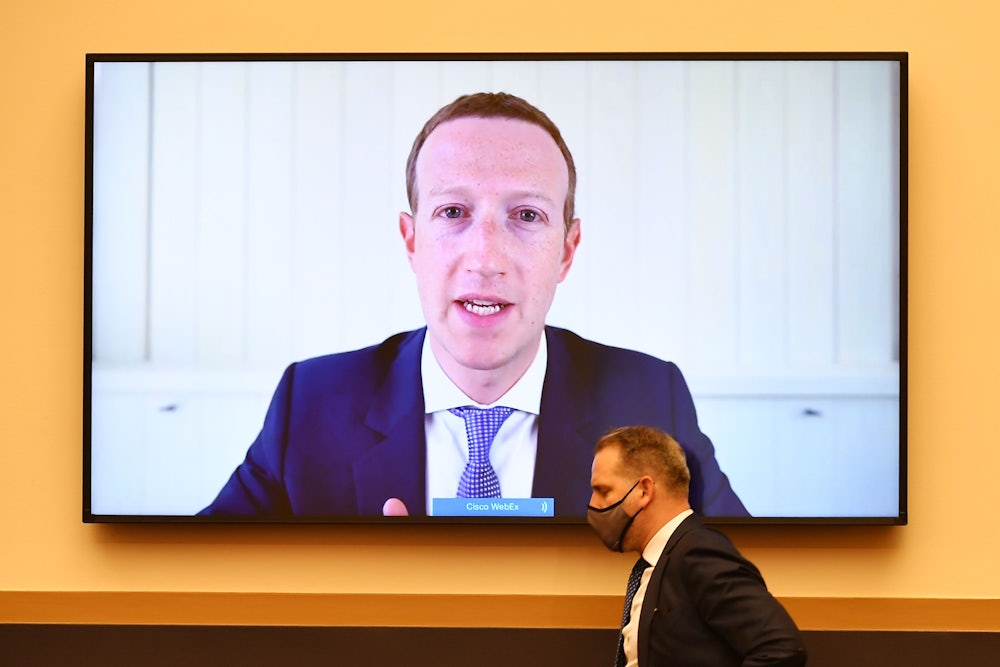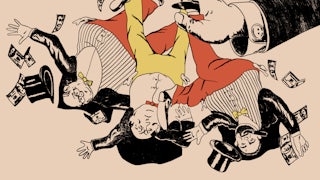Tech industry “regulation is overdue,” writes Nick Clegg, the former British deputy prime minister turned Facebook vice president of global policy. In an op-ed for CNBC today, Clegg declared that “for too long, many of these important issues”—privacy, competition, data rights—“have been left to private companies to deal with alone.” Facebook, which, besides Google, exercises more influence over what people see and read than any other entity in the world, is horrified by these developments—which apparently had nothing to do with it—and ready to hammer out a deal with government regulators.
As Clegg’s op-ed demonstrates, we’ve reached the stage in the battle over the power of Big Tech when even some of the most monopolistic of Silicon Valley companies are begging to be regulated: Oops! Too much power here. Please help! Or at least that’s the surface sentiment emerging from companies like Facebook and Twitter, which have asked the U.S. government to take some of the hard decisions of platform governance out of their hands. As Twitter CEO Jack Dorsey said earlier this year, internet companies have simply become too powerful.
On a strategic level, it makes sense. Rather than antagonize a Democratic administration that has made overtures to more intensive regulation, antitrust investigations, and possible breakups, tech companies are pouring money into lobbying firms and offering calculated entreaties in the form of humble public statements and op-eds by company leaders: Let us work with you, they say. We want to collaborate—on undoing the harms that this most powerful and unequal of American industries has created.
We shouldn’t listen to them. Whatever sure-to-be-insufficient efforts are made to repair a broken internet can’t involve tech giants as anything but subjects to be criticized, broken up, and, if necessary, prosecuted. These grand-partnership offers from mind-blowingly wealthy corporations represent their own form of power and coercion, and they should be treated with the withering skepticism they deserve.
Clegg’s is the latest request from Silicon Valley for the government to please—oh please—do something about tech’s overwhelming power. (Daily ads on podcasts like The Wall Street Journal’s morning news roundup also remind listeners that Facebook absolutely wants to be regulated.) “This is a pivotal moment for ‘techno-democracies’ like the US to regulate the internet in a way that preserves the values at the heart of the open and global internet,” tweeted Clegg, borrowing a term that President Joe Biden has used to describe the United States and other info-economy-dependent allies. In his op-ed, Clegg brushed off calls for breaking up tech companies—perhaps the most forthright and bluntly effective way of tamping down the industry’s power—and asked instead for regulations that might preserve the lucrative status quo.
Portraying authoritarian countries like Vietnam, Russia, and Turkey as boogeyman, Clegg promised that Facebook could be a partner in preserving an “open, accessible, and global internet,” one that “has been shaped by American companies and American values like free expression, transparency, accountability, and the encouragement of innovation and entrepreneurship.” China, he warned, with its “extensive surveillance” and firewall from the wider world, “presents a risk to the open internet.” (A Facebook executive warning against “extensive surveillance” is the height of irony, but we should expect brazenness at this point.)
In calling for an essentially nationalist vision of the global internet—defined by American values as interpreted by megacompanies like Facebook—Clegg was making the rhetorical substitution “techno-democrats” often do, assuming that Western technologies, values, and policies should apply to the communications and informational intake of people worldwide. This line of thinking assumes that other countries, including authoritarian ones, should have little sovereignty over their own tech industries and the data within their borders.
However much we should be wary of the digital encroachments of Russia or Turkey, the response shouldn’t be a forced imposition of American values, technology, and authority under the aegis of a false digital cosmopolitanism. At worst, this represents a form of digital colonialism—such as when Facebook tried to bring its internet-lite service to India and faced public backlash—or moral compromise and collaboration, such as when Western tech companies give in to Chinese data-storage requirements to access a lucrative growing market. The U.S. mission of “internet freedom,” heavily promoted by Hillary Clinton’s State Department, has too often been simply a crude tool for advancing American influence, rather than a democracy-promoting initiative.
With its paeans to an open global internet, Facebook is working to preserve a technological order in which it has total dominance, where its own toxic business model—mass surveillance, data collection, and behavioral targeting—has wreaked havoc on everything from small-town newspapers to country-wide political discourse. Facebook wants some acceptable rules and controls that might maintain its pole position. “The values of an open and global internet are not the values of Facebook,” said Paul Bernal, a law professor, on Twitter.
Indeed, not everyone shares in Facebook’s particular vision of free communal info-abundance underwritten by bulk data collection and addictive algorithms. Nor do they care for what Facebook has become. From political disinformation to authoritarian state propaganda to surveillance-as-a-business-model to the hollowing out of arts, culture, and media, Facebook, and its influence on the internet, has been a net loss for the world. The company aspires toward liberalish values—for instance, Zuckerberg talks about “voice” rather than “free speech”—but all of this has been window-dressing for its own destructive pursuit of scale, power, and profit.
Following a pattern that we’ve seen in the more contrite recent statements from platform superpowers, Clegg seems to say that Facebook wants to do better—it just needs help. “As society grapples with how to address misinformation, harmful content, and rising polarization, Facebook research could provide insights that help design evidence-based solutions,” writes Clegg, as if Facebook, with its endless reams of data, insight into its own networks, and $62 billion in cash on hand couldn’t be doing far more to tackle these problems. In helping address these concerns, Clegg also offers support for a “digital regulator”—something that would be useful but potentially no more so than the Federal Trade Commission or the Department of Justice, which have wide powers to sue Facebook, initiate antitrust proceedings, and enforce the law. (In working to shape government regulation, Facebook spent almost $20 million on D.C. lobbying last year, more than any other tech company.)
Parsing Nick Clegg’s statements—and the overall sincerity of Facebook’s pledges—may be a fool’s game. The answer to regulating the internet, as Jillian C. York noted, is to “keep Facebook out of any and all decisions about regulating the internet.” Companies don’t give up power voluntarily; they cede ground knowing they can make it up elsewhere. Clegg’s op-ed has all the hallmarks of this kind of bait and switch. It offers a few paper-thin reforms that might pass bipartisan muster—if Congress can find its better angels—that will surely be undone after lawyers and lobbyists begin chiseling away at them. If there’s to be a future “open and global internet,” it should represent everything Facebook is not. The scary and exciting thing is that we don’t yet know how to bring that into being.








